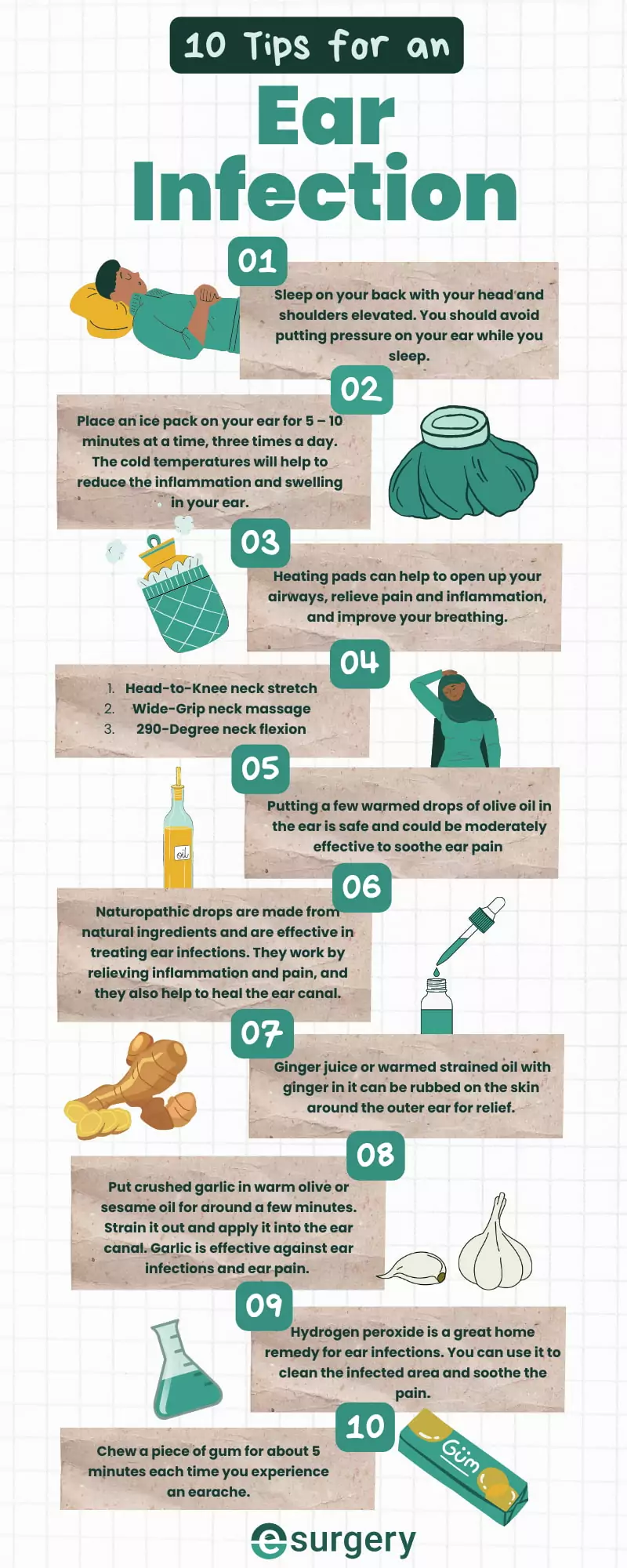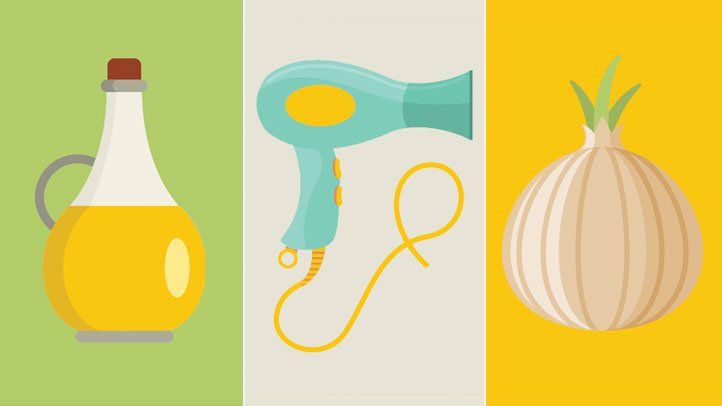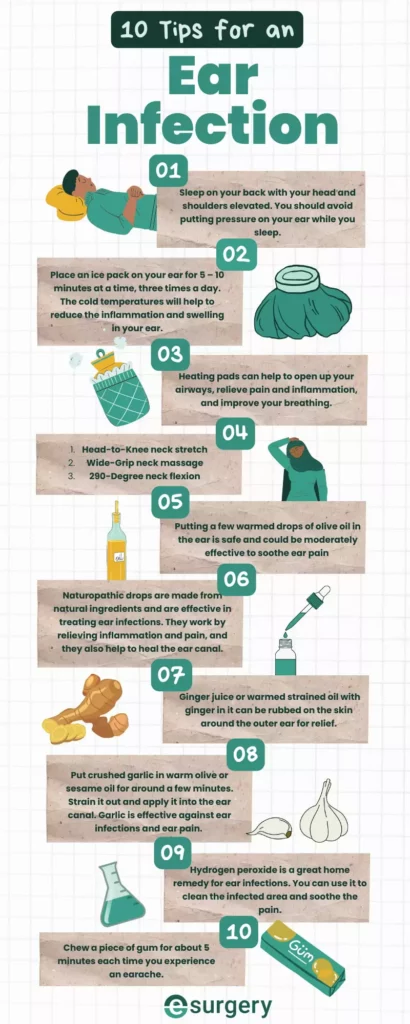Do you constantly suffer from ear infections? Have you tried various medications but still haven’t found any relief? Well, fret not! In this article, we will discuss natural remedies for ear infection that you can try at home. So, grab a cup of tea, sit back, and let’s dive into the wonderful world of natural ear care.
Ear infections can be extremely bothersome and can cause pain and discomfort. They can be caused by various factors such as bacteria or viruses, and the symptoms can range from mild to severe. If you’re tired of relying on antibiotics and want to explore natural alternatives, you’re in the right place. In this article, we will explore different natural remedies that can help alleviate the symptoms and even prevent future ear infections.
From the use of garlic oil to warm compresses, we will delve into the world of natural remedies that have been used for centuries to provide relief for ear infections. We will discuss the science behind these remedies and how to properly use them. So, if you’re ready to learn more about how to naturally care for your ears and find relief from those pesky infections, keep reading. Your ears will thank you!
What is an Ear Infection?
Definition of an ear infection
An ear infection, also known as otitis media, refers to the inflammation or infection of the middle ear. It is a common condition that can affect people of all ages, but it is more prevalent in children. In most cases, ear infections occur as a result of a bacterial or viral infection in the ear.
Causes of ear infections
Ear infections can have several causes, including:
-
Bacterial infections: Streptococcus pneumoniae and Haemophilus influenzae are the most common bacteria that cause ear infections. These microorganisms can enter the middle ear through the Eustachian tube, which connects the ear to the back of the throat.
-
Viral infections: Viral respiratory infections, such as the common cold, flu, or sinusitis, can also lead to ear infections. When the Eustachian tube becomes blocked due to swelling or mucus buildup, it creates an ideal environment for bacteria or viruses to multiply.
-
Allergies: Allergic reactions can cause inflammation and congestion in the Eustachian tube, increasing the likelihood of developing an ear infection.
-
Anatomical factors: Certain structural abnormalities, such as enlarged adenoids or cleft palate, can contribute to the development of ear infections.
Types of ear infections
There are three main types of ear infections:
-
Acute otitis media: This is the most common type of ear infection, often associated with a bacterial or viral infection. It causes sudden onset ear pain, fever, and sometimes, hearing loss.
-
Otitis media with effusion: This type occurs when fluid accumulates in the middle ear without infection. It often happens after an acute ear infection has resolved, but the fluid remains trapped in the middle ear, causing hearing difficulties.
-
Chronic otitis media: This type of infection persists or recurs frequently. It can cause long-term damage to the eardrum or middle ear structures if left untreated.
Symptoms of Ear Infection
Common symptoms of an ear infection
When you have an ear infection, you may experience the following symptoms:
- Ear pain or discomfort
- Feeling of fullness or pressure in the ear
- Reduced hearing or muffled sounds
- Fluid drainage from the ear
- Fever
- Irritability, especially in children
- Trouble sleeping
- Vertigo or loss of balance
Signs to look out for in children
In infants and young children, it can be challenging to recognize the symptoms of an ear infection. Besides the common symptoms mentioned above, parents should also look out for:
- Tugging or pulling at the ear
- Excessive crying or fussiness
- Difficulty hearing or responding to sounds
- Poor appetite or feeding difficulties
- Loss of balance or clumsiness
- Delayed speech development
When to seek medical attention
It is crucial to seek medical attention if you or your child experience persistent or severe symptoms associated with an ear infection. Additionally, the following situations warrant immediate medical attention:
-
High fever: If you or your child’s fever exceeds 102 degrees Fahrenheit (38.9 degrees Celsius), it is essential to consult a doctor.
-
Prolonged symptoms: If symptoms persist for more than two days without any improvement, it is advisable to seek medical advice.
-
Complications of untreated ear infections: If left untreated, ear infections can lead to severe complications, such as eardrum rupture, hearing loss, and the spread of infection to nearby structures.
Preventing Ear Infections
Maintaining good ear hygiene
Maintaining proper ear hygiene can help reduce the risk of developing ear infections. Here are some tips for maintaining good ear hygiene:
-
Gently clean the outer ear with a washcloth. Avoid inserting anything into the ear canal, such as cotton swabs, as they can push wax further into the ear or cause injury.
-
Dry your ears thoroughly after swimming or bathing. Excess moisture in the ear can create a favorable environment for bacterial growth.
-
Avoid using earplugs or headphones for extended periods, as they can irritate the ear canal and increase the risk of infection.
Avoiding exposure to irritants
Exposure to certain irritants can increase the likelihood of developing ear infections. Here are some tips to avoid irritants:
-
Avoid smoking or exposure to secondhand smoke, as it can irritate the respiratory system and increase the risk of ear infections.
-
Minimize exposure to environmental pollutants, such as industrial chemicals or pollutants, which can irritate the respiratory system.
Strengthening the immune system
A strong immune system plays a vital role in preventing infections, including ear infections. Here are some ways to strengthen your immune system:
-
Eat a balanced diet rich in fruits, vegetables, whole grains, and lean proteins.
-
Get regular exercise to maintain overall health and strengthen the immune system.
-
Ensure adequate rest and sleep to support a healthy immune system.
-
Minimize stress levels, as chronic stress can weaken the immune system.
Natural Remedies for Ear Infection
Natural remedies can help alleviate the symptoms of ear infections and promote healing. Here are some effective natural remedies for ear infections:
Garlic oil
Garlic oil has antimicrobial properties that can help combat the infection causing ear pain. You can make garlic oil by crushing a garlic clove and mixing it with a few drops of olive oil. Warm the mixture slightly and strain it. Apply a few drops of the garlic oil into the ear canal using a dropper. Leave it for a few minutes before draining it out.
Apple cider vinegar
apple cider vinegar has antiseptic properties that can help kill bacteria and fungi while restoring the pH balance in the ear. Mix equal parts of apple cider vinegar and water. Soak a clean cloth or cotton ball in the mixture and place it on the affected ear for about 10 minutes. Repeat this remedy a few times a day for relief.
Tea tree oil
Tea tree oil has antibacterial and antifungal properties, making it useful in treating ear infections. Dilute a few drops of tea tree oil with a carrier oil, such as olive oil or coconut oil. Apply a few drops of this mixture to the affected ear using a dropper. Leave it for a few minutes before tilting your head to drain it out.
Essential oils for ear infections
Several essential oils, such as lavender, chamomile, and eucalyptus, possess antibacterial and anti-inflammatory properties that can help relieve ear infection symptoms. Dilute a few drops of the essential oil with a carrier oil and apply it to the outer ear using a cotton ball. Avoid placing undiluted essential oils directly into the ear canal.
Warm compress
A warm compress can help relieve pain and reduce inflammation in the ear. Dip a clean washcloth in warm water, wring out the excess water, and place it over the affected ear for about 10 minutes. Repeat this remedy several times a day for relief.
Salt water rinse
A salt water rinse can help remove excess fluid and debris from the ear, providing relief from ear infection symptoms. Mix half a teaspoon of salt in a cup of warm water. Use a dropper to put a few drops of this solution into the affected ear. Tilt your head to allow the fluid to drain out.
Breast milk as a remedy
Breast milk contains antibodies that can help fight infections, including ear infections. Place a few drops of breast milk into the affected ear using a dropper. Leave it for a few minutes before draining it out.
While these natural remedies can provide relief, it is important to note that they may not cure the infection entirely. If symptoms persist or worsen, it is crucial to seek medical advice.
Home Remedies for Ear Pain
Hot water bottle
Applying a hot water bottle or heating pad to the affected ear can help soothe ear pain. Ensure to wrap the hot water bottle or heating pad with a thin cloth to avoid burns. Apply it to the affected ear for about 15 minutes.
Onion juice
Onions have anti-inflammatory properties that can help ease ear pain and reduce swelling. Grate an onion and squeeze out the juice. Apply a few drops of the onion juice into the affected ear using a dropper. Leave it for a few minutes before draining it out.
Olive oil
Olive oil can help alleviate ear pain by lubricating the ear canal and reducing inflammation. Warm a small amount of olive oil and apply a few drops into the affected ear using a dropper. Leave it for a few minutes before draining it out.
Chewing gum
Chewing gum can help equalize pressure in the ears and relieve pain caused by changes in altitude during air travel or diving. Chew a piece of sugarless gum before and during the ascent or descent to promote equalization of pressure.
When to Consult a Doctor
While natural and home remedies can provide relief for mild ear infections, there are instances where it is necessary to consult a doctor. The following situations require medical attention:
Persistent or severe ear pain
If you or your child experiences persistent or severe ear pain that does not improve with natural or home remedies, it is essential to consult a doctor. Severe ear pain may indicate an underlying condition that requires medical attention.
High fever
If you or your child’s fever exceeds 102 degrees Fahrenheit (38.9 degrees Celsius), it is important to seek medical advice. A high fever can be a sign of a more serious infection that requires medical management.
Prolonged symptoms
If symptoms persist for more than two days without any improvement, it is advisable to consult a doctor. Prolonged symptoms may indicate a more severe infection or an underlying condition that requires medical evaluation.
Complications of untreated ear infections
If left untreated, ear infections can lead to several complications, including eardrum rupture, hearing loss, and the spread of infection to nearby structures. If you or your child experience any complications or worsening symptoms, it is crucial to seek medical attention immediately.
Dos and Don’ts for Ear Care
Proper ear care can help prevent ear infections and maintain ear health. Here are some dos and don’ts for ear care:
Cleaning ears properly
-
Clean the outer ear regularly with a washcloth to remove dirt and excess wax. Avoid using cotton swabs, as they can push wax further into the ear canal.
-
Do not insert any objects, such as hairpins or bobby pins, into the ear canal to remove wax or debris. This can cause injury or damage to the delicate structures of the ear.
Avoiding cotton swabs
Cotton swabs should not be used to clean the ear canal or remove wax. The ear canal is self-cleaning, and using cotton swabs can push wax deeper into the ear, leading to blockages or injury.
Using ear protection in noisy environments
Exposure to loud noises can damage the delicate structures of the ear. Use ear protection, such as earplugs or earmuffs, in noisy environments, such as concerts, construction sites, or when operating heavy machinery.
Not ignoring ear discomfort
If you experience discomfort, pain, or changes in hearing, it is important not to ignore these symptoms. They may indicate an underlying condition that requires medical evaluation.
Alternative Treatments for Ear Infections
In addition to natural remedies, some alternative treatments may be considered for ear infections. These treatments aim to address the underlying causes and promote overall well-being. However, it is important to consult a qualified healthcare professional before starting any alternative treatments. Some alternative treatments for ear infections include:
Chiropractic care
Chiropractic care focuses on the musculoskeletal system and its impact on overall health. Some individuals find relief from ear infections through chiropractic adjustments, which aim to realign the musculoskeletal system and enhance nerve function.
Acupuncture
Acupuncture involves the insertion of thin needles into specific points on the body to promote healing and balance. Some individuals report improvement in ear infection symptoms after acupuncture treatment.
Herbal remedies
Certain herbs have antimicrobial and anti-inflammatory properties that can help support the immune system and alleviate ear infection symptoms. Herbs such as Echinacea, elderberry, and garlic may be used in herbal remedies for ear infections.
Ear Infection in Children
Common causes of childhood ear infections
Ear infections are particularly common in children due to their anatomy. The Eustachian tube in children is shorter and more horizontal, making it easier for bacteria or viruses to enter the middle ear. Additionally, children have less developed immune systems, making them more susceptible to infections.
Treatment options for children
Treatment for ear infections in children may include antibiotics if the infection is bacterial. Pain relievers may also be recommended to alleviate discomfort. In some cases, the doctor may suggest a ‘watchful waiting’ approach, where symptoms are closely monitored, and antibiotics are only prescribed if symptoms worsen or do not improve.
Managing ear infections in infants
Managing ear infections in infants requires extra care and attention. Infants may be irritable, have difficulty feeding, or experience disrupted sleep due to ear pain. It is important to consult a pediatrician for appropriate diagnosis and treatment. The doctor may recommend pain relievers or prescribe antibiotics if necessary.
Conclusion
Ear infections can be painful and disruptive, but with proper care and early treatment, they can be managed effectively. Natural remedies, such as garlic oil, apple cider vinegar, and warm compresses, can help alleviate symptoms and promote healing. However, it is important to remember that natural remedies may not cure the infection entirely, and medical advice should be sought if symptoms persist or worsen.
Maintaining good ear hygiene, avoiding exposure to irritants, and strengthening the immune system are important preventive measures for ear infections. Additionally, following dos and don’ts for ear care, such as avoiding cotton swabs and using ear protection in noisy environments, can help maintain ear health.
While natural and home remedies can provide relief for mild ear infections, it is important to seek medical attention if symptoms persist or worsen. High fever, persistent or severe ear pain, and complications of untreated ear infections require immediate medical attention. Seeking prompt medical advice can prevent further complications and promote faster recovery.
In conclusion, ear care naturally involves using natural remedies when appropriate, taking preventive measures, and seeking medical attention when necessary. By prioritizing ear health and adopting a holistic approach, you can effectively manage ear infections and maintain optimal ear health.





